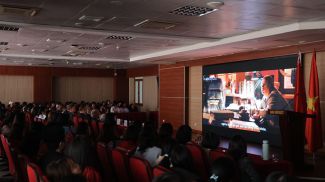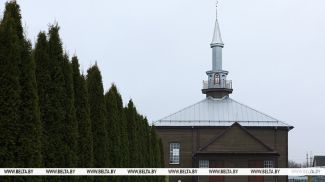A system of regulations on nuclear and radiation safety is in vigorous development in Belarus, particularly after the decision in favor of building the Belarusian nuclear power plant was made. The development of these regulatory acts took into account recommendations of international experts, including results of International Atomic Energy Agency (IAEA) missions. Representatives of the Nuclear and Radiation Safety Department of the Belarusian Emergencies Ministry (Gosatomnadzor) came to BelTA's press center to talk about what “nuclear law” means and what legislation novelties one should expect in the near future.
A system to regulate nuclear and radiation safety started evolving back in the USSR days. Belarus is a legal successor state in a number of international agreements, which were adopted back then. At present Belarus is a party to most of the conventions in this sphere, including the 1994 Convention on Nuclear Safety, the 1997 Joint Convention on the Safety of Spent Fuel Management and on the Safety of Radioactive Waste Management, and the Vienna Convention on Civil Liability for Nuclear Damage.
The national system of statutory regulation of nuclear and radiation safety has been built in compliance with the IAEA's recommended pyramid and has a hierarchical structure. Regulatory acts of a lower tier have to comply with regulatory acts of a higher tier. International conventions and treaties and the Constitution are at the top. Below them are presidential decrees and laws. The next level includes resolutions of the Council of Ministers followed by resolutions of the Emergencies Ministry. As for technical regulatory acts, those include norms and rules on nuclear and radiation safety as well as guidelines that explain regulatory requirements in detail.
The law on the radiation safety of the population was passed in Belarus in 1998. According to Gosatomnadzor Deputy Head Grigory Astashko, it was based on a model law, which had been developed within the framework of the Commonwealth of Independent States. The Belarusian law was amended from time to time, including due to the decision to build the Belarusian nuclear power plant and due to the adoption of the law on using nuclear energy in 2008. A number of bylaws on safety aspects have also been worked out in Belarus.
The legislation gets constantly updated taking into account current requirements, the law enforcement practice, and recommendations of experts. A new law on radiation safety came into force in June 2020. International experts speak in positive terms about the law. The main novelties include the introduction of a differentiated approach depending on the degree of danger of a source, the definition of a standardization system and technical standardization regulatory acts. The law introduced consulting in the area of radiation safety as well as a procedure for registering types of sources of ionizing radiation, said Head of Gosatomnadzor's Legal Support Sector Yelena Zhigalko.
It has been 13 years since the law on using nuclear energy was adopted. It has not changed fundamentally since then. Pinpoint amendments were introduced in 2011. However, the implementation of the nuclear power plant construction project and its forthcoming operation have accelerated the process of the document's correction. This year's lawmaking plans include the development of a new law on regulating safety aspects in the course of using nuclear energy. The bill will take into account the recommendations and proposals submitted as a result of International Atomic Energy Agency missions as much as possible. The bill is supposed to be brought into the House of Representatives of the National Assembly in March 2022, Yelena Zhigalko said. According to Gosatomnadzor Deputy Head Grigory Astashko, the new law will more clearly stipulate the responsibility of the nuclear power plant operating company to ensure safety in the course of its work. Matters concerning the organization of the regulatory authority's work will be clarified as well.
Important documents include presidential decree No.62 of 16 February 2015. The decree regulates safety in the course of building and operating the Belarusian nuclear power plant. The decree addressed matters of oversight organization and introduced public hearings.
Yelena Zhigalko pointed out that a new bill on licensing is in development in Belarus. “Within the framework of this process we are getting away from blanket regulation. The relevant presidential decree has been drafted and forwarded to the Belarus President Administration for review and approval. The decree will approve a regulation on licensing activities in the area of usage of nuclear energy and sources of ionizing radiation. Apart from licensing it is also necessary to adjust the unified legal classification system, which lacks legislation on nuclear and radiation safety for now,” she said.
Gosatomnadzor has submitted proposals on adjusting the unified legal classification system and received the approval of the national center for legal information. “In view of the construction of the nuclear power plant it is important to separate the relevant legislation into a dedicated independent branch. Moreover, the need for Belarus to have nuclear legislation was mentioned in the International Atomic Energy Agency in May 2019 and was backed by international experts,” Yelena Zhigalko noted.
The official underlined that Belarus takes persistent steps to realize the program on development of nuclear legislation. The program will be included into a draft national policy on nuclear and radiation safety. It is supposed to happen within the next two years.













